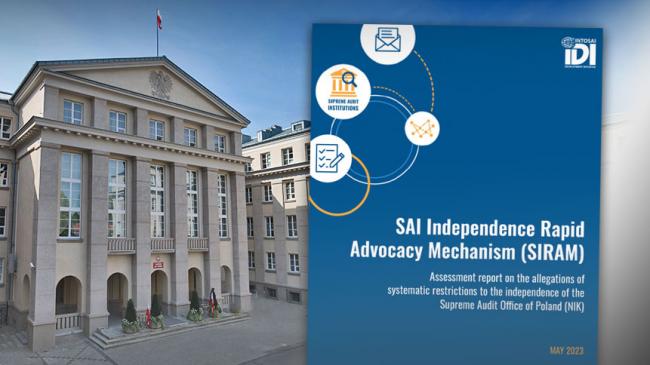The report findings are devastating. An international team of experts, based on collected evidence and opinions, analysis of the provisions of law and actual state of affairs established that a threat has occurred in Poland relating to the breach of a range of significant principles adopted in the Mexico Declaration on Independence of Supreme Audit Institutions [INTOSAI P-10]. It concerns four principles:
- Principle 2 - Independence – meant as the independence of SAI heads and members of collegial institutions, including security of tenure and legal immunity,
- Principle 3 – Freedom in discharge of statutory tasks - broad mandate and full discretion in the discharge of SAI functions,
- Principle 4 - Unrestricted access to information in the course of audits,
- Principle 8 - Financial and managerial/administrative autonomy and the availability of appropriate human, material, and monetary resources,
which is the worst outcome in the history of the SAI Independence Rapid Advocacy Mechanism (SIRAM) to date.
According to IDI a breach of principles of the independent state audit was committed. The report highlighted the following issues as a threat to efficient functioning of the state audit in Poland:
Significant delays in the appointment of the NIK Council and the Director General of NIK
It was pointed out that candidates proposed by NIK President Marian Banaś are not appointed for the Council of NIK, nor is the Director General of NIK. From 30 August 2019 to 11 July 2022, NIK President Marian Banaś addressed the Marshal of the Sejm nine times and submitted 34 motions to appoint new members of the NIK Council. Only seven candidates received positive opinions of the Sejm Committee on State Audit and – as a consequence – were appointed by the Marshal of the Sejm for the NIK Council. The NIK President also moved for consent to appoint the Director General of NIK. In that case the Marshal of the Sejm moved to the Sejm Committee on State Audit for opinion about the candidate proposed by the NIK President. Though, the Act on NIK states in Article 21 Section 2 that “the President of the Supreme Audit Office of Poland, upon consent of the Marshal of the Sejm appoints and dismisses the Director General of NIK...”. Therefore, a candidate for the Director General is not subject to the opinion of the Sejm Committee on State Audit. Based on the negative opinion of the said Committee on 23 February 2022, the Marshal of the Sejm declined the motion of the NIK President to appoint the Director General of NIK.
The IDI report reveals that the abovementioned measures prevent NIK from efficient discharge of its constitutional and statutory obligations based on the respect of the principle of independence. The said interference in NIK’s activity undermines the rule of law in Poland. Since the position of Director General of NIK is vacant, most tasks naturally allocated to that office are performed by the NIK President. It means that the NIK President is overloaded with duties related to the internal functioning of the Polish SAI, which are not related to the core of NIK’s operations, that is the state audit.
Interference in audits conducted by NIK auditors
The team investigating the case in the light of the SAI Independence Rapid Advocacy Mechanism – SIRAM also indicated constraints encountered by NIK auditors when conducting audits. It is about cases of impeding or preventing audits of particular interest to the public. The report focuses on two audits: Implementation of measures to improve fuel security in the oil sector and Selected expenditures of companies with a State Treasury share and of foundations established by these companies, and financial management and implementation of statutory objectives of these foundations. Those audits were broadly discussed during the sitting of the Sejm Committee on State Audit and dealt with the denial of access to particular documents by auditees as part of audits conducted among others in PKN Orlen and related entities. Despite unequivocal opinions of scholars in law, court judgements and principles of logical reasoning, some of the documents have not been provided to NIK auditors yet.
The conclusions of the IDI report refer directly to the issues mentioned above. The restrictions encountered by NIK auditors in the said audits, according to IDI, represent a breach of Principles 3 and 4 of the Mexico Declaration on SAI Independence.
Financial limitations faced by NIK
A lot of attention in the report has been paid to the issue of guaranteeing financial independence to NIK. In line with Principle 8 of the Mexico Declaration on SAI Independence, Supreme Audit Institutions should be provided with human, material, and financial resources necessary for its appropriate operations. However, on 25 October 2022, the Sejm Committee made an amendment to NIK’s budget for 2023, cutting remunerations of NIK employees by the total of nearly PLN 51 million. At the same time, the State Labour Inspectorate received a 15% pay rise, and the budget of the Chancellery of the Prime Minister increased by 80%.
The absence of appropriate financing has an adverse effect on the recruitment process at NIK, which directly translates into NIK’s proper functioning in the context of discharge of its constitutional tasks. In 2022, as many as 21 recruitment processes were not settled, which represented about 35% of all recruitments. Too low remuneration was one of the reasons why candidates rejected NIK’s offers. According to IDI experts – although there are no grounds to formally confirm a breach of the said Principle 8 of the Mexico Declaration – the failure to provide appropriate funds to NIK may considerably lower NIK’s capacity to discharge its duties. Nevertheless, IDI recommends in the report conclusion that – considering the position of NIK as a supreme and independent body of state audit – the Supreme Audit Office of Poland should be provided with the level of financing adequate to its constitutional and statutory responsibilities.
We kindly recommend reading the full report in the English-language version.


